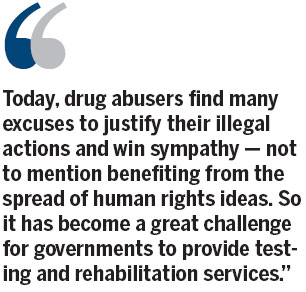How to stop young people taking drugs?
Updated: 2013-12-09 07:04
By Ho Hon-kuen(HK Edition)
|
|||||||||
The Action Committee Against Narcotics (ACAN) has released a paper on the RESCUE Drug Testing Scheme, with the public consultation to end in January. From what we saw in media reports and responses from the education sector, not much discussion on the paper has followed. Is this because people are too busy to care or are simply not interested?
Statistics show that in any society the social costs of providing rehabilitation for drug users improve when drug bans and preventive measures work. In ancient times, before western ideas changed our views about death penalty, the government only needed to announce a total ban on drugs and ensure drug abusers were executed. Today, however, drug abusers find many excuses to justify their illegal actions and win sympathy - not to mention benefiting from the spread of human rights ideas. So it has become a great challenge for governments to provide testing and rehabilitation services. You could call it the "damned if you do and damned if you don't" approach.
After reading all 31 pages of the consultation paper, I consider it is a thoughtfully-composed and serious document. It notes on Page 4 that some experts believe the number of drug abusers aged 21 to 30 has increased because many only began abusing when they were teenagers and were only recently discovered. It points out on Page 9 that drug abuse has become increasingly covert in recent years. This is despite increased efforts by the government and people fighting drug abuse. The sooner we find the hidden abusers and encourage them to seek help, the better.
The emphasis of the document is clearly on timely prevention and treatment. But the government must tread carefully in promoting drug testing and early rehabilitation in Hong Kong. People are very protective of their freedoms and human rights. The consultation paper makes a good point in advocating early testing for more effective elimination, on one hand, but avoiding infringements of individual rights, on the other. This is to keep the RESCUE scheme from being interpreted as an attempt to invade people's privacy. The paper only implies what the ACAN thinks should be done with the scheme, instead of stating frankly what it will do.

In terms of my personal understanding of the consultation paper I believe the RESCUE Drug Testing Scheme wants to achieve the following: First, operatives of the scheme have the power to enforce it at public venues when they have reasonable evidence; Second, operatives can recommend a drug abuser to a rehab facility when there is sufficient evidence, but will not prosecute that person. If that person is a recidivist offender, he or she will be dealt with differently. There are similar, even harsher measures, in countries such as Sweden, Singapore and Britain over treatment of recidivist drug abusers.
Drugs are a horrible scourge. Anyone addicted to them can ruin their lives and other peoples. I agree with the principle of timely intervention and early treatment, but I am more interested in the experiences of other countries. We can learn a lot from them on how people who run testing and rehab programs provide training, and how they convince people to take drug tests and win over lawmakers to support these schemes. The key to the success of such programs is the government's commitment to them. They are an investment in a healthy future.
In schools and other education facilities implementing such programs has been difficult. This is because of concerns about human rights and privacy as well as worries about interrupting classes and teachers. It has been practically impossible to carry out carpet testing to locate drug-abusing students in schools. This makes it all the more urgent to activate the RESCUE Drug Testing Scheme on campuses soon - preferably with more government funding and more well-trained staff. This will help establish a mechanism to allow social workers to refer drug-abusing students to rehab facilities as soon as their illegal acts are confirmed. This is the only way to implement the scheme on campuses. Schools and teachers, alone, cannot handle a challenge like this.
No doubt it is extremely hard to reach common understanding over the RESCUE scheme. But that should not be an excuse to give up. However diverse our views on dealing with drug abuse are, there can be no disagreement that it should be eradicated.
The author is vice-chairman of Education Convergence.
(HK Edition 12/09/2013 page9)